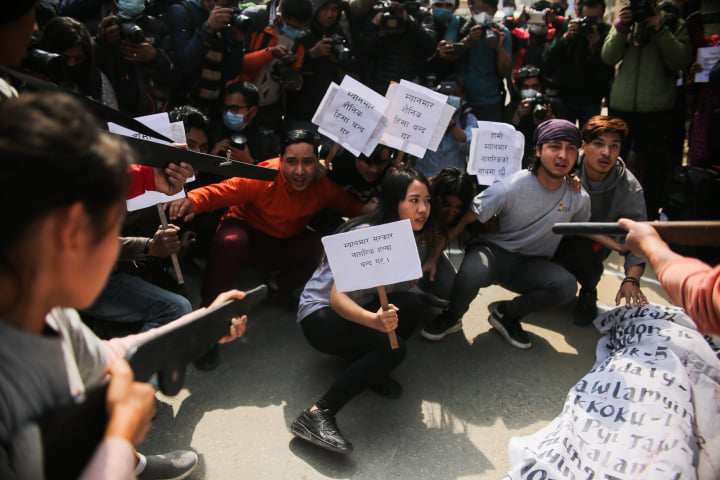Asia’s new Cold War

The recent coup in Burma is a stark reminder that the future of democracy in South East and South Asia faces a treacherous path ahead. Although some observers disagree, the world has entered what we might term, the ‘New Cold War’.
In this new world order, reminiscent of the Cold War from the 1950s to 1980s, many Asian countries will face the heat of an intense rivalry between two camps. The first one is led by the US and the EU and the other is led by China, often followed by Russia. This rivalry will not only challenge our understanding of, but erode and undermine democracy.
The 1 February 2021 coup by Burma’s military junta was condemned by people in different parts of the world, while we also saw civil society representatives in Kathmandu demonstrate against it. More than 50 people have died at the hands of the military during a month of strife and many have been jailed or disappeared.
In response to the coup and the spate of violence unleashed by the state, the world witnessed a polarised tussle of opinion. The UN Security Council held an emergency meeting on 3 February, during which, the two camps failed to condemn the coup.
Thus far, the members have not been able to collectively denounce the coup except calling for the release of Burma’s democratic leader, Aung Sang Su Kyi. The world should not feel surprised if similar disagreements and tussles increase in this new world order, undermining democracy in the region.
The implications of such differences could run deeper than they appear, for those of us who live in South East and South Asia. The power dynamics that the rivalries unleash unintentionally will reinforce ‘illiberal’ democracies and authoritarian regimes.
Under such political circumstances, some countries might enjoy economic prosperity, but their citizens will live under a continuously controlled and coerced society (e.g., in Brunei, Cambodia, Thailand, Singapore, Sri Lanka and Vietnam). Countries that have turbulent, violent histories and unstable governments, such as Sri Lanka, Burma, Nepal, Maldives and Afghanistan, are likely to further plunge into instability and infighting.
These states lack strong institutions, suffer from infighting amongst political rivalries, experience high level of corruption, rely heavily on foreign direct investment and foreign aid. This, in turn, poses challenges for them to build stable, inclusive, self-determined governments, despite both camps’ outward claims of supporting all of these objectives.
Almost all of the South and South East Asian people once lived under colonial rule. Even countries like Nepal and Thailand, that did not directly experience colonial rule, remained under its influence.
After independence, India, Pakistan, Bangladesh, Vietnam and Cambodia saw violent partisan struggles. In the case of Indonesia, the Philippines, Thailand, Burma, Sri Lanka, and Afghanistan, there were also armed insurrections.
Most of the violent events— many of them still ongoing— are rooted in ethnicity, religion and regionalism. The first Cold War made building inclusive stable societies in these post-colonial states more complicated, fanning the flames of insurgency and division.
In the post-colonial era, many leaders anchored themselves around strong nationalist personas, aiming to rewrite their countries’ history. Such efforts, while noble in some regard, often undermined democratic principles by forcefully assimilating ethnic and religious minorities under a ‘collective nationalism’.
Unsurprisingly, this fueled divisions, mistrust, acrimonies and inequalities, leading to violent uprisings. The ‘democracies’ they created primarily served the elite, and in some cases, certain ethnic groups. The new Cold War rivalries, unfortunately, will reinforce similar types of democracies throughout Asia.
Vietnam evidences this. A communist country that once fought a bloody war, Vietnam has become an important economic partner and regional ally for the US as it seeks to deter Chinese influence in the region.
In Cambodia, despite the UN and many western donor agencies spending billions of dollars to build liberal democracy in the country, authoritarianism has prevailed. But China enjoys ‘deep’ economic ties with the government and continues to invest billions of dollars.
In Burma, during the nearly six decades-long junta rule, China remained one of its most trusted allies. Apparently, it made the Generals so anxious it led them to initiate democratic reform in 2011.
The recent coup will undoubtedly bring them back closer as the West will inevitably impose sanctions against the junta while China chooses its ‘non-interference’ diplomacy securing a ‘deep’ tie with the Generals.
In Sri Lanka, while the West was criticising the Mahindra Rajapaksa government for human rights violence as it crushed the Tamil rebels, the Chinese made a deal with it to build one of the biggest seaports in the region.
The new Cold War rivalries fueled by another power nation, India, will continue to shape the future of democracy and stability in the region. It has unleashed fresh risk for politically unstable and violent societies in the region, as well as countries that have histories of military rule. Political leaders in Nepal and elsewhere are likely to blame external influences of the US, China and India instead of recognising and questioning their own competence.
As the new Cold War rivalries accelerate – whether intentional or not – their positioning is likely to make way for more illiberal democracies and authoritarian regimes to emerge. Those in leadership will find little or no incentive to address the issues of the poor and marginalised, thus pushing them further into the abyss.
If countries, like Nepal, want to preserve their commitment to democratic principles, it is time for the state and its people to start acting like we mean it.
Dhirendra Nalbo, Ph.D. is a lecturer and the co-founder of the Open Institute for Social Science. He writes on issues related to the environment, geopolitics, conflict, and peace.





